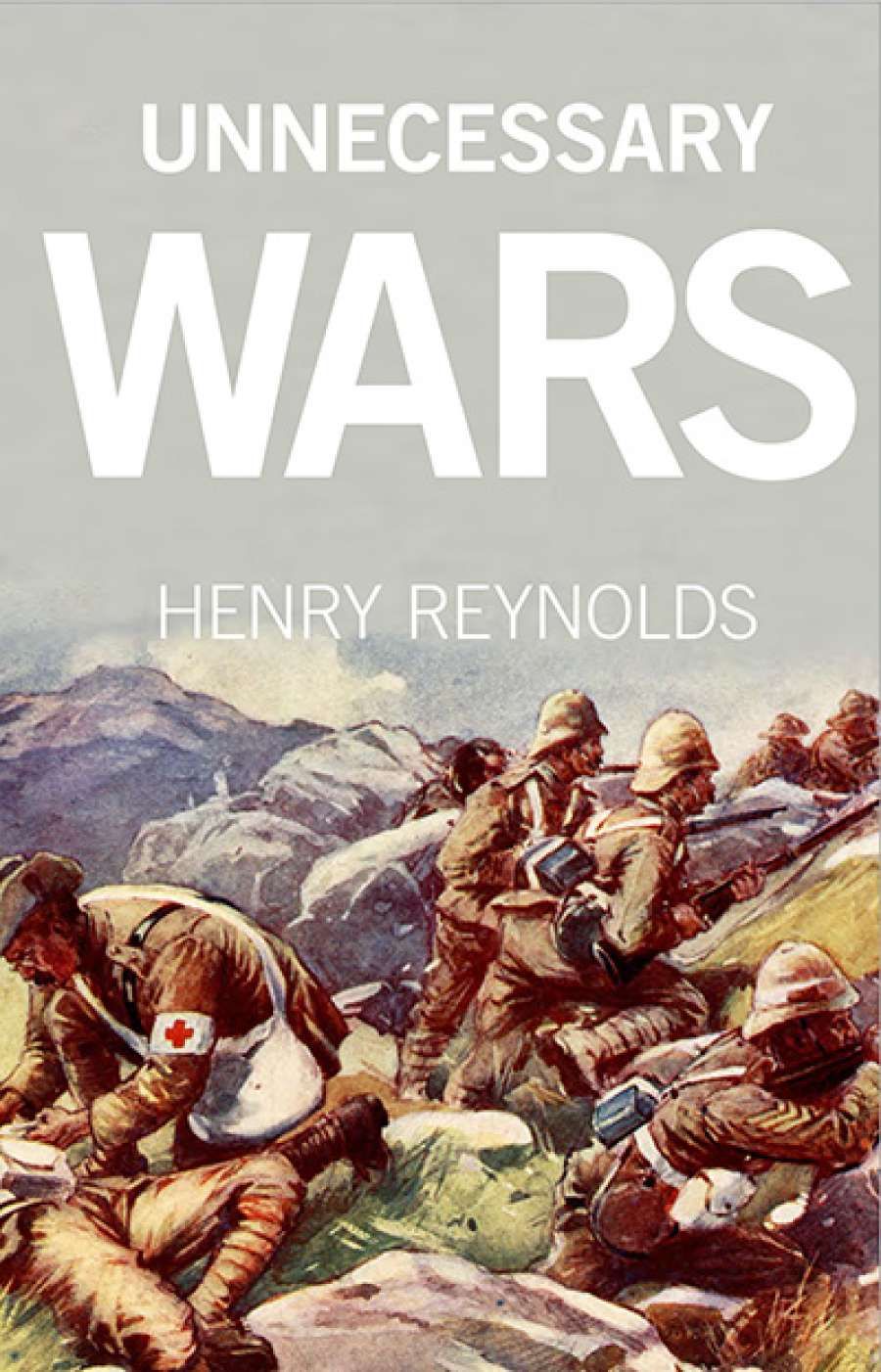
- Free Article: No
- Contents Category: Australian History
- Custom Article Title: Peter Stanley reviews 'Unnecessary Wars' by Henry Reynolds
- Custom Highlight Text:
In 1885 the Singleton MHA and Militia officer Albert Gould reflected that, New South Wales having sent a contingent to fight for the empire in the Sudan, 'we shall be ...
- Book 1 Title: Unnecessary Wars
- Book 1 Biblio: NewSouth, $29.99 pb, 280 pp, 9781742234809
Reynolds detects disturbing parallels between the war that coincided with Federation and the war in which Australia has been involved for the past fifteen years, with no end in sight. 'Has our tradition of military engagement,' he asks, 'been a terrible, profound and continuing mistake?' This is a brave and unsettling question to ask at a time, as he writes, when past wars are 'intensely commemorated'. (Money for nationalist commemoration, he observes, is no object; he wonders how the $100m being spent on the Sir John Monash Centre in France might help museums currently experiencing savage cuts.) Australia, he argues, has been 'a deferential and biddable client' of the British and now the American superpowers. 'The British Empire is no more,' he observes, 'but habits learnt in its shadow linger.' Reynolds shows how deep those shadows are.
What lifts Unnecessary Wars from the charge of polemic is that, impassioned though it is, it is infused with an awareness of past debates about war and about Australia's relationships with, and obligations toward, empires and allies. Reynolds repeatedly shows that this is not just a twenty-first-century reaction against US imperialism (and Australian sycophancy). One hundred and fifty years ago, Australians were voicing arguments against involvement in wars of no direct concern to them.
In the 1980s, David Martin launched the idea of 'Armed Neutrality' for Australia. It offered, and remains, a beguiling prospect for Australians tired of becoming bogged in wars at the behest of 'great and powerful friends'. Australia, the argument goes, has entered one war after another either because of its membership of the British Empire and Commonwealth, or as a result of its eagerness to pay its dues towards the United States, which, it is hoped, would rescue it in the event of a serious military threat. But even proponents of armed neutrality seemed unaware of Australia's long tradition of scepticism toward entangling alliances.
 John Howard and George W. Bush in 2005 (photograph by Carolyn Drake, via Wikimedia Commons)
John Howard and George W. Bush in 2005 (photograph by Carolyn Drake, via Wikimedia Commons)
Of course, the corollary of neutrality would be a much more heavily militarised Australia than the one we have now. The risks are that, despite paying the premiums, Australia will be induced to embark on unjustifiable wars (as in Vietnam, Iraq, and Afghanistan) as the price of the US alliance. Australia, as George Reid, Australia's third prime minister, foresaw, would 'offer up our men upon any shrine of blood that offers itself'. Forty Australian dead in Afghanistan, for example, is regarded by governments of both stripes as an acceptable price.
Many of my military historian colleagues reject the idea that Australia has repeatedly fought 'other people's wars'. They argue that Australian leaders determined that entering into wars as an ally of Britain or the United States was in Australia's 'national interest', however nebulous. But Australian war dead rest in about seventy-five countries, after a dozen conflicts claiming more than 100,000 Australian lives. Did they all have to die, Reynolds asks.
He uses Australia's involvement in the Boer War as a means to raise significant broader questions. Unnecessary Wars is not specifically about that war, though he does reveal how, notwithstanding imperial fervour and patriotic blandishments, bloody it was, with 25,000 casualties among the Boer population, and untold African ones.
Unnecessary Wars is much more relevant than its quaint Boys' Own cover would suggest. It is not a retelling of Australia's part in the Boer War. The conduct of Australian soldiers in South Africa, for example, is only germane because it exposes the casual brutality expected of men in war. (I was reminded of a soldier's diary I quoted when working on the War Memorial's Boer War gallery thirty years ago: 'reached Amsterdam, a nice little town, which we burned.') Despite a candid quasi-official history (Craig Wilcox's Australia's Boer War, 2002), most people have no idea how awful a war it was when Australians dutifully joined the empire to suppress independent Boer republics (admittedly racist ones; but racism was something both sides agreed on). Reynolds quotes Tony Abbott praising those who fought in the war as upholding 'the rights of the weak against the strong ... we don't fight to conquer; we fight to help', a grotesque distortion of reality.
War remains seemingly ineradicable in Australia's conception of itself. We no longer believe in White Australia, but we persist in imagining that 'the nation' was somehow 'born' in war, a relic of the Darwinian notion that war is 'a creative force in national life', a delusion annually reinforced on Anzac Day. Reynolds rightly observes that it is 'truly astonishing' that 'these long discredited ... ideas are embodied in the most important national ceremonies ... passed on as holy writ to our children'.
As Malcolm Fraser belatedly acknowledged, Australia's alliance with the United States 'has now become dangerous to Australia's future'. Involvement in any US military response to a resurgent China or a rogue North Korea becomes increasingly likely. Neither a Coalition nor Labor government would be likely to challenge the nature of this relationship. This is hardly a novel analysis: as early as 1870, Victorian royal commissioners identified the colonies' subservient relationship with Britain as 'so wanting in mutuality that it cannot safely be regarded as a lasting one'.
But that's Reynolds's point: we've had these debates before. We need to have them again. As he writes, 'past and present meet'.


Comments powered by CComment